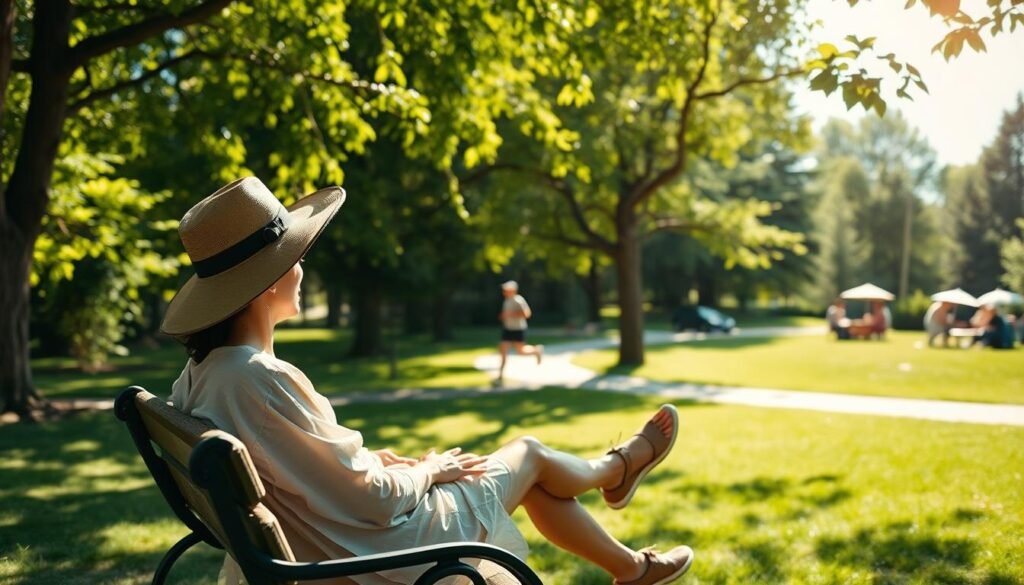Can a simple daily dose of sunlight really be the key to unlocking better health? For many, the answer lies in understanding the therapeutic benefits of safe sun exposure.
Exposure to sunlight has been linked to various health benefits, including the production of a crucial nutrient that plays a significant role in our overall wellbeing.
As we explore the concept of sunlight as medicine, it becomes clear that its benefits extend far beyond just one aspect of health. By understanding how to harness the power of sunlight safely, individuals can potentially improve their health in meaningful ways.
Key Takeaways
- Safe daily sun exposure has multiple health benefits.
- Sunlight plays a role in producing a vital nutrient.
- Understanding sunlight’s therapeutic benefits can improve overall wellbeing.
- Proper sunlight exposure can have a positive impact on health.
- Harnessing sunlight’s power requires understanding safe exposure practices.
Understanding Vitamin D and Its Role in the Body
Vitamin D is very important for our bodies. It helps with strong bones, immune function, and health. It’s a fat-soluble vitamin.
What is Vitamin D?
Vitamin D comes from diet, supplements, and sunlight. It’s called the “sunshine vitamin” because our skin makes it when we’re in the sun. Vitamin D is not just a vitamin; it’s a hormone that helps regulate calcium levels, promoting bone health and supporting immune function.
How Vitamin D Affects Immune Function
Vitamin D greatly affects our immune system. It helps control genes involved in fighting off infections. Research has shown that vitamin D deficiency is associated with an increased risk of autoimmune diseases and infections. Vitamin D helps keep our immune system strong, which is key to staying healthy.
Sources of Vitamin D: Beyond the Sun
While sunlight is a big source of vitamin D, it’s not the only one. Foods like fatty fish, fortified dairy, and some mushrooms also have it. Supplements are also available for individuals who are deficient or at risk of deficiency. It’s important to get enough vitamin D from these sources to stay healthy.
Benefits of Sunlight Therapy for Mental Health
Sunlight therapy is getting more attention for mental health. It’s seen as a natural way to boost wellbeing. This section looks at how sunlight can help with mood and Seasonal Affective Disorder (SAD).
The Link Between Sunlight and Mood
Sunlight is key for mood control. Natural sunlight releases serotonin, which lifts mood and fights depression. People who spend more time outside feel better mentally.
Morning sunlight is especially good. It helps set the body’s clock, making us feel awake and full of energy. Adding morning sunlight to daily routines can make a big difference in mood and mental health.
Sunlight Therapy for Seasonal Affective Disorder (SAD)
Seasonal Affective Disorder (SAD) hits in winter when it’s dark. Sunlight therapy is a proven treatment. It involves bright light to mimic natural light, helping the body’s clock and mood.
Studies show sunlight therapy works as well as meds for SAD. Using light therapy lamps or spending time outside during peak hours can help. It can ease SAD symptoms and boost mental health.
In summary, sunlight therapy is a natural, effective way to improve mental health, especially for SAD. Understanding sunlight’s effect on mood can help us use it to better our wellbeing.
How Sunlight Supports Immune Function
Research shows sunlight helps our immune system fight off diseases. This is mainly because sunlight boosts vitamin D production. Vitamin D is key for a healthy immune system.
Mechanisms of Immune Support from Sun Exposure
Sunlight starts a chain of events that boosts our immune system. It mainly does this by making vitamin D. Vitamin D is vital for controlling immune cells.
Vitamin D’s role in supporting the immune system is complex. It affects how genes related to the immune system work. It also keeps the body’s outer layer strong against infections. Plus, not having enough vitamin D makes us more likely to get sick and develop autoimmune diseases.
Research on Sunlight and Viral Infections
Studies have looked into how sunlight affects viral infections. Places with more sunlight have fewer viral infections. This might be because vitamin D, made by sunlight, boosts the immune system.
For example, influenza and other viruses are less common in sunny areas. The exact reasons are still being studied. But, the evidence suggests sunlight helps our immune system fight off viruses.
The Science Behind Circadian Rhythm
The body’s natural circadian rhythm is tied to sunlight. It controls sleep, hormone levels, and more. This internal clock is key to our health.
Importance of Circadian Rhythm in Overall Health
A healthy circadian rhythm is vital for health. It affects metabolism, heart health, and mental well-being. Disruptions can lead to diseases like diabetes and heart disease. So, it’s important to support our circadian rhythm.
“Circadian rhythm regulation is crucial for our well-being,” experts say. Getting enough sunlight helps keep our rhythm in check. This leads to better sleep, mood, and health.
How Sunlight Regulates Sleep Patterns
Sunlight greatly affects our sleep. When sunlight hits our eyes, it tells our brain to wake up. The brain then aligns our body with day and night, helping us sleep right.
Using sunlight to regulate sleep improves sleep quality. It also boosts our immune system. Morning sunlight helps set our rhythm for the day, making us feel alert.
Natural Healing Through Sunlight Exposure
Sunlight has been valued for its healing powers for centuries. Now, science is uncovering its full benefits. Being in sunlight triggers many health responses that improve our well-being.
Benefits of Sunlight for Skin Health
Sunlight is key for healthy skin. Getting some sun can help with skin issues like acne, psoriasis, and eczema. UV rays in sunlight reduce inflammation and help skin heal.
Vitamin D production is another big plus of sunlight for skin. When UV rays hit our skin, they make vitamin D. This vitamin is vital for skin health and keeping it strong.
Healing Properties of Sunlight
Sunlight therapy, or phototherapy, helps treat many health issues. Sunlight affects our body’s clock, boosts mood, and strengthens the immune system.
“Light therapy has been shown to be effective in treating Seasonal Affective Disorder (SAD) and other conditions related to the body’s internal clock.”
Sunlight’s healing effects also include less pain and inflammation. It helps wounds heal faster and improves both physical and mental health.
Safe Sun Exposure Practices
To enjoy sunlight safely, it’s key to follow some important practices. Sunlight is great for health but too much can harm your skin. It can cause damage and even increase the risk of skin cancer.
Recommended Duration of Sun Exposure
The right amount of sun time changes based on several things. These include your skin type, where you live, and the time of day. Usually, 10 to 15 minutes in the early morning or late afternoon is enough for vitamin D.
Factors Influencing Safe Sun Exposure:
- Skin Type: Fair skin needs less sun, while darker skin may need more.
- Geographical Location: Near the equator, you can spend more time outside safely.
- Time of Day: Avoid the sun’s strongest rays between 10 am and 4 pm.
| Skin Type | Recommended Sun Exposure |
|---|---|
| Fair Skin | 5-10 minutes |
| Medium Skin | 10-15 minutes |
| Darker Skin | 15-30 minutes |
Using Sunscreen: When and How?
Sunscreen is vital for safe sun exposure. It shields your skin from harmful UV rays, lowering sunburn and cancer risks.
Guidelines for Using Sunscreen:
- Choose a broad-spectrum sunscreen with an SPF of at least 30.
- Apply sunscreen 15 to 30 minutes before going outside.
- Reapply every two hours or right after swimming or sweating.

Knowing how long to stay in the sun and using sunscreen right can help you enjoy sunlight safely. This way, you can benefit from sunlight while keeping your skin protected.
Sunlight and Vitamin D Deficiency
Sunlight is key for making vitamin D, and not enough can cause health problems. Vitamin D is vital for strong bones, a healthy immune system, and overall health.
Signs and Symptoms of Deficiency
Vitamin D deficiency shows in many ways. You might feel fatigue, bone pain, and muscle weakness. In serious cases, it can cause osteoporosis and rickets in children.
Other signs include depression, slow healing of wounds, and getting sick often. Spotting these signs early is key to avoiding serious health problems.
Prevention and Treatment of Deficiency
To avoid vitamin D deficiency, you need safe sun exposure, the right diet, and supplements if needed. Being outside, especially when the sun is strongest, helps a lot.
Health experts say, “A daily dose of sunlight is key for healthy vitamin D levels.”
“Vitamin D helps your body absorb calcium, which is important for strong bones.”
Eat foods high in vitamin D like fatty fish, fortified dairy, and cereals. If your deficiency is severe, your doctor might suggest supplements.
- Eat a balanced diet with plenty of vitamin D.
- Go outside regularly.
- Take supplements if your doctor says it’s okay.
The Role of Sunlight in Bone Health
Getting outside in the sun is a natural way to boost vitamin D levels. This vitamin is key for strong bones. When we’re in the sun, our skin makes vitamin D, which is vital for bone health.
Vitamin D’s Contribution to Bone Density
Vitamin D helps keep bones strong by controlling calcium levels in our bodies. When we have enough vitamin D, our bodies absorb calcium better. This helps our bones stay strong.
Studies show that not having enough vitamin D can weaken bones. This can lead to osteoporosis and a higher risk of fractures.
Key benefits of vitamin D for bone health include:
- Enhanced calcium absorption
- Regulation of bone remodeling
- Support for muscle function, reducing the risk of falls
Sunlight as a Natural Remedy for Osteoporosis
Osteoporosis makes bones weak, making them more likely to break. Sunlight helps by boosting vitamin D levels, which can fight osteoporosis. Regular, safe sun exposure helps keep bones healthy and lowers osteoporosis risk.
It’s important to protect our skin while enjoying the sun. Talking to a doctor can help find the right balance for you.
Sunlight and Heart Health
Sunlight is good for more than just vitamin D. It also helps keep your heart healthy. The link between sunlight and heart health is complex. It involves direct and indirect ways to make your heart better.
How Sunlight Can Improve Cardiovascular Health
Sunlight is good for your heart in many ways. One big way is by lowering blood pressure. Studies show that regular sunlight can help lower blood pressure. This reduces the risk of heart disease.
Sunlight also makes your skin release nitric oxide. This helps blood vessels relax and improves blood flow. It lowers blood pressure and boosts heart function.

The Impact of Vitamin D on Blood Pressure
Vitamin D, made in the skin by sunlight, is key for heart health. Research links vitamin D deficiency to higher blood pressure and heart disease risks.
A study found that people with more vitamin D had lower blood pressure risks. Vitamin D helps control blood pressure by regulating important systems in the body.
“Vitamin D is not just important for bone health; it also plays a critical role in cardiovascular health by influencing blood pressure regulation and reducing the risk of heart disease.”
While scientists are still learning, it’s clear that vitamin D from sunlight is good for your heart.
Incorporating Sunlight into Your Daily Routine
Getting sunlight every day can change your life. It boosts your mood and helps your body’s clock stay in sync. Just a few tweaks to your daily routine can bring big benefits.
Easy Ways to Get Your Daily Dose of Sun
Getting sunlight is easy. Just take a short walk outside in the morning or at lunch. Even simple things like gardening or reading outside can help.
- Take a morning walk
- Garden during the day
- Have lunch outside
- Read by a sunny window
Dr. Andrew Weil says natural light is key for a healthy body clock. Simple habits can make a big difference.
Activities to Enjoy Outdoors
Being outside is fun and good for you. Try hiking, biking, or yoga outside. These activities give you sunlight and boost your health.
| Activity | Benefits | Sun Exposure Level |
|---|---|---|
| Hiking | Improves cardiovascular health, boosts mood | High |
| Outdoor Yoga | Enhances flexibility, reduces stress | Medium |
| Gardening | Provides physical exercise, promotes relaxation | High |
Harvard Health Publishing says sunlight helps your body’s clock. This can lead to better sleep and health. Adding these activities to your day can really help.
“The sun’s rays are a natural source of energy and vitality. By embracing sunlight, we can improve our health and wellbeing in numerous ways.”
Cultural Perspectives on Sunlight and Healing
Sunlight is a key element in healing practices across cultures. It shows how important it is for our well-being. For centuries, sunlight has been used in traditional healing worldwide.
Historical Uses of Sunlight in Medicine
For ages, sunlight has been seen as healing. The Egyptians, Greeks, and Indians used it in their medicine. For example, Heliotherapy, a Greek practice, used sunlight to treat illnesses.
In Ayurveda, sunlight is used to balance the body’s energies. Many indigenous cultures also see sunlight as sacred, vital for healing rituals.
Modern Practices in Sunlight Therapy
Today, sunlight’s healing effects are still valued. Light therapy is used to treat SAD and depression. It uses special lights to mimic natural sunlight.
Research also shows vitamin D’s importance, made in the skin by sunlight. It’s crucial for natural healing. Not having enough vitamin D can lead to health problems.
Sunlight’s role in healing is more than just a treatment. It’s a key part of our health and well-being. We must find a balance between enjoying sunlight and avoiding too much.
Myths and Misconceptions About Sun Exposure
Sun exposure has sparked a lot of debate. Many myths and misconceptions surround its health benefits. While too much sun can be harmful, some sun is good for us.
Debunking Common Myths
One myth is that sun exposure is always bad and should be avoided. But, some sun is needed for vitamin D. Vitamin D is key for strong bones and a healthy immune system.
Another myth is that dark-skinned people don’t need sun protection. While melanin offers some protection, everyone should still protect their skin from the sun.
The Facts About Sun Safety
Knowing the facts about sun safety is important. For example, exposure during peak hours (10 am – 4 pm) raises sunburn risk.
- Seek shade when the sun is strongest.
- Use protective clothing, such as hats and sunglasses.
- Apply sunscreen with a Sun Protection Factor (SPF) of 30 or higher.
By understanding and following these tips, we can enjoy the sun’s benefits safely.
Conclusion: Embracing the Healing Power of the Sun
Throughout this article, we’ve seen how sunlight is key to our health. It helps our bodies keep a good rhythm and boosts our immune system. It also stops us from getting too little vitamin D.
Regulating Our Internal Clock
Being in the sun helps our body’s internal clock work right. This is crucial for feeling good. It makes us sleep better, feel more energetic, and think clearer.
Preventing Deficiencies
Vitamin D deficiency is common, especially where it’s dark a lot. Safe sun time each day helps avoid this. It keeps our bones strong.
By being careful with sun time, we can use the sun’s power to get healthier. So, take a break each day to go outside. Breathe in the air and enjoy the sun’s warmth.



